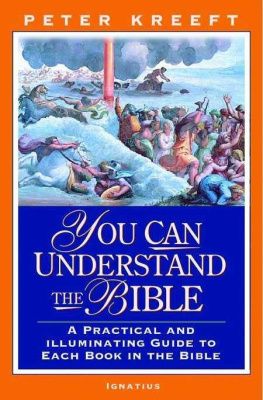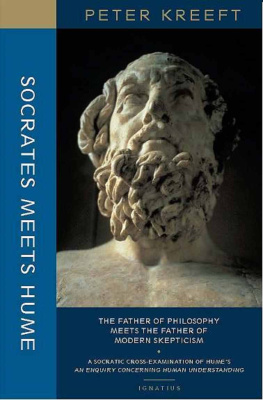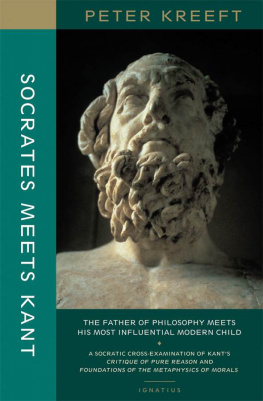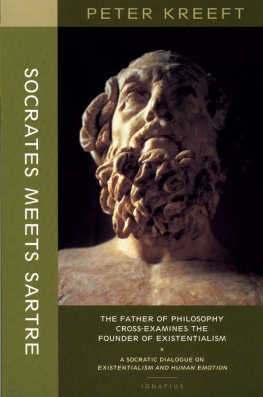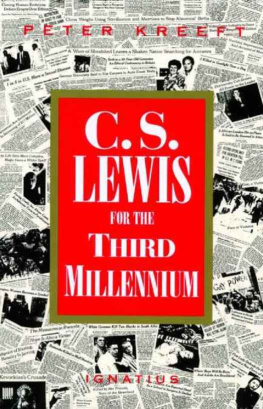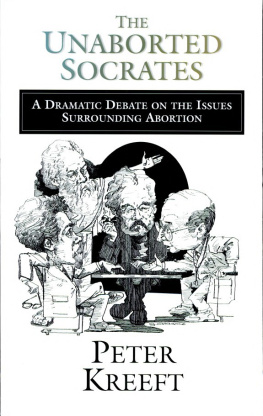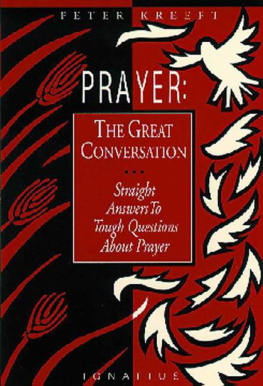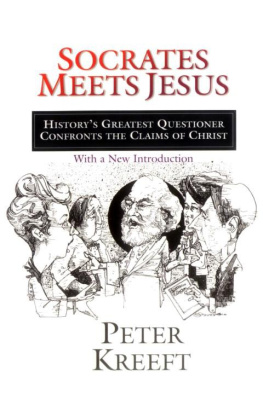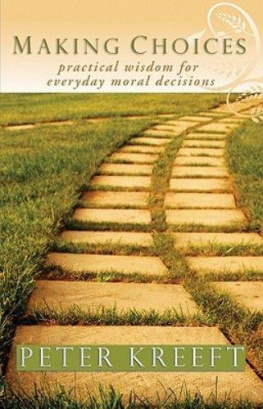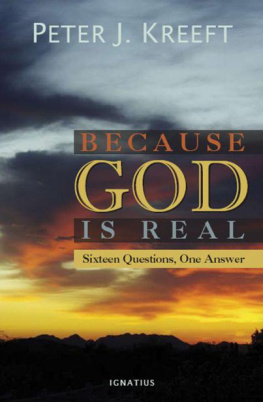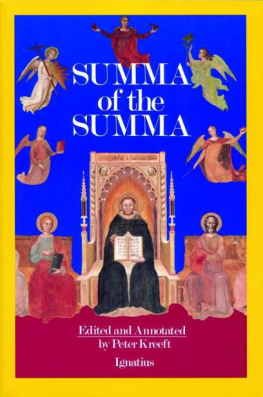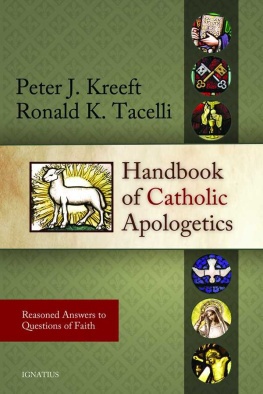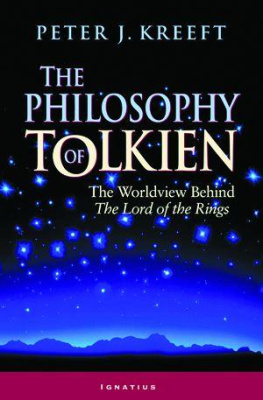Peter Kreeft - Ask Peter Kreeft: The 100 Most Interesting Questions Hes Ever Been Asked
Here you can read online Peter Kreeft - Ask Peter Kreeft: The 100 Most Interesting Questions Hes Ever Been Asked full text of the book (entire story) in english for free. Download pdf and epub, get meaning, cover and reviews about this ebook. year: 2019, publisher: Sophia Institute Press, genre: Religion. Description of the work, (preface) as well as reviews are available. Best literature library LitArk.com created for fans of good reading and offers a wide selection of genres:
Romance novel
Science fiction
Adventure
Detective
Science
History
Home and family
Prose
Art
Politics
Computer
Non-fiction
Religion
Business
Children
Humor
Choose a favorite category and find really read worthwhile books. Enjoy immersion in the world of imagination, feel the emotions of the characters or learn something new for yourself, make an fascinating discovery.

- Book:Ask Peter Kreeft: The 100 Most Interesting Questions Hes Ever Been Asked
- Author:
- Publisher:Sophia Institute Press
- Genre:
- Year:2019
- Rating:3 / 5
- Favourites:Add to favourites
- Your mark:
- 60
- 1
- 2
- 3
- 4
- 5
Ask Peter Kreeft: The 100 Most Interesting Questions Hes Ever Been Asked: summary, description and annotation
We offer to read an annotation, description, summary or preface (depends on what the author of the book "Ask Peter Kreeft: The 100 Most Interesting Questions Hes Ever Been Asked" wrote himself). If you haven't found the necessary information about the book — write in the comments, we will try to find it.
Peter Kreeft: author's other books
Who wrote Ask Peter Kreeft: The 100 Most Interesting Questions Hes Ever Been Asked? Find out the surname, the name of the author of the book and a list of all author's works by series.
Ask Peter Kreeft: The 100 Most Interesting Questions Hes Ever Been Asked — read online for free the complete book (whole text) full work
Below is the text of the book, divided by pages. System saving the place of the last page read, allows you to conveniently read the book "Ask Peter Kreeft: The 100 Most Interesting Questions Hes Ever Been Asked" online for free, without having to search again every time where you left off. Put a bookmark, and you can go to the page where you finished reading at any time.
Font size:
Interval:
Bookmark:
Peter Kreeft
Ask Peter Kreeft
The 100 Most Interesting Questions
Hes Ever Been Asked
SOPHIA INSTITUTE PRESS
Manchester, New Hampshire
Copyright 2019 by Peter Kreeft
Printed in the United States of America. All rights reserved.
Cover design by Perceptions Design Studio.
On the cover: vintage microphone (280987793) Oleg Krugliak / Shutterstock.
Unless otherwise noted, Scripture quotations are taken from the Revised Standard Version of the Bible: Catholic Edition, copyright 1965, 1966 the Division of Christian Education of the National Council of the Churches of Christ in the United States of America. Used by permission. All rights reserved.
No part of this book may be reproduced, stored in a retrieval system, or transmitted in any form, or by any means, electronic, mechanical, photocopying, or otherwise, without the prior written permission of the publisher, except by a reviewer, who may quote brief passages in a review.
Sophia Institute Press
Box 5284, Manchester, NH 03108
1-800-888-9344
www.SophiaInstitute.com
Sophia Institute Press is a registered trademark of Sophia Institute.
Library of Congress Cataloging-in-Publication Data
Names: Kreeft, Peter, author.
Title: Ask Peter Kreeft : the 100 most interesting questions hes ever been
aked / Peter Kreeft.
Description: Manchester : Sophia Institute Press, 2019. | Summary:
Answers to a hundred questions on philosophy, religion, morality,
culture, and other topics that people have asked author Peter Kreeft
Provided by publisher.
Identifiers: LCCN 2019025006 | ISBN 9781622828609 (paperback) ePub ISBN 978-1-622828-616
Subjects: LCSH: Theology Miscellanea. | Catholic
Church Doctrines Miscellanea. | Philosophy Miscellanea
Classification: LCC BR118 .K695 2019 | DDC 230 dc23
LC record available at https://lccn.loc.gov/2019025006
Contents
Introduction
Ask Peter Kreeft? What a ridiculous title! Who is he, anyway, the Answer Man? Even God refused to be the Answer Man to Job: His answer was only more questions.
I didnt choose that arrogant-sounding title; the publisher did. So blame the publisher.
But Sophia Institute Press is a great publisher because they are devoted to Sophia, which means wisdom. The ancient Greek Sophists claimed to have wisdom; Socrates claimed only to be in love with it, so he called himself not a sophist but a philo-sophist, or philosopher, literally, a lover of wisdom.
I say four cheers for Socrates!
Hardly ever have I heard a lecture (i.e., a monolog) that did not bore me. Hardly ever have I heard a Q & A (i.e., a dialog) that did. That is why Plato, the first and greatest writer of philosophy, wrote in dialogs. No one ever wrote philosophy better than Plato. Wouldnt you think that after 2,400 years, philosophers would learn at least to try to imitate him?
Christians claim to know the ultimate reason for the superiority of dialog over monolog: it is because dialog is one step closer to trialog, which is the nature of ultimate reality, i.e., the Trinity. Monolog is boring. Thats why God must be more than one lonely, egotistic, boring divine Person. My favorite argument for the central and most distinctive tenet of Christianity, that Jesus is God in the flesh, is this: Jesus was the only person in history who never bored anyone who met Him. I think that is an even more impressive sign of His divinity than His miracles are.
I give a lot of lectures around the country, in universities and churches, usually to very engaged, thoughtful, curious audiences; and I always make as much time as possible for Q & A afterward.
Here are some of the most interesting questions I have been asked, and my answers. They are essentially the questions I got and the answers I gave in real Q & A sessions, though some of the answers are longer and more leisurely. Speaking is always more time conscious and under the gun than writing is. Sometimes I expanded my answers a lot, sometimes a little, sometimes not at all.
They are a mixed bag, as real questions from real people always are. All of them except one or two were asked in Q & A, but not usually word for word: I condensed most of the questions and expanded some of my answers. Some are profound, some silly; some tragic, some funny; some easy, some hard; some simple, some complex.
Enough. The best introductions are the shortest. (My favorite was Heeeeres Johnny!)
Philosophy
You teach philosophy. Why? What is philosophy good for? What can I do with it?
Nothing. But it can do something with you.
Its like truth, goodness, and beauty that way, and also love, joy, and peace, and also faith, hope, and charity. Its not like money, power, business, consulting, leadership, management, medicine, math, or technology, all of which are practical means to some further end. Philosophy means the love of wisdom, and the love of wisdom implies the wisdom of love, and love and wisdom are both ends, not just means. They are worth doing and having for their own sakes.
What can philosophy do with you? It can open you up, like a coconut, like an egg. You are designed to hatch, to open up. If you dont, you get rotten. Philosophy, like your five bodily senses, leads you out of the dark little prison of yourself into a larger world. It can get you out of Platos cave, where all you see are shadows.
It can give you the second greatest thing in the world, which is the thirst for the greatest thing in the world. That greatest thing has many names and many attributes. Wisdom and love are two of them.
Really, all those things wisdom, love, truth, goodness, beauty are attributes of God. So true philosophy is really the search for God, even if the philosopher doesnt know that and doesnt use that name in fact, even if the philosopher is an atheist. God is usually present anonymously. He is humble, unlike us.
Augustine implies this divine anonymity when he says, in his Confessions , that his conversion began long before he became a Christian, when he became a philosopher by reading Ciceros great exhortation to philosophy, the Hortensius (a book that has been lost to history), because he fell in love with eternal wisdom, long before he knew the true God personally and religiously, long before he knew that the thing he loved wisdom was to be found in its fullness only in God.
Philosophy will give you the search, the questions. It might even give you some answers, but it will always give you great questions. It will make you a little Socrates, and Socrates can help you to move to the next step, which is to become a little Christ. Philosophy will change you from a pig satisfied to Socrates dissatisfied. And then Socrates can help you begin the journey from Socrates dissatisfied toward Socrates satisfied as Augustines restless heart and mind were eventually satisfied.
Even if philosophy makes you only dissatisfied and unhappy, its good. Being unhappy with Brave New World, with Platos cave, with your pigsty and mud pies thats progress. In fact, it is necessary. William Barrett, in Irrational Man , defends studying Jean-Paul Sartre, probably the most famous nihilist and pessimist in the history of philosophy, this way: It is better to confront our own existence in despair than never to confront it at all. Despair can be a powerful moment on the road to hope.
Thoreau said: The mass of men lead lives of quiet desperation. T. S. Eliot called us hollow men and said that we measure out our lives with coffee spoons. There is an alternative: good philosophy, especially classic philosophy. (But not most current academic, scholarly philosophy. Sampling both will show you the difference.)
Thats half the answer: the greatness of philosophy, something to be proud of. Here is the other half of the answer, and its just as important as the first half: that philosophy is something to be humble about; that Socrates was right when he said that the only wisdom is to know you have no wisdom; that there are only two kinds of people: fools, who think they are wise, and the wise, who know they are fools. If Socrates is right, most philosophers are not as wise as farmers and ditch diggers. In fact, philosophers are often nuts. Descartes says, There is no idea so absurd that it has not been taught by some philosopher. We say in academia about a really ridiculous idea: That idea could be believed only by a philosopher. Either half of my answer without the other is equally wrong.
Next pageFont size:
Interval:
Bookmark:
Similar books «Ask Peter Kreeft: The 100 Most Interesting Questions Hes Ever Been Asked»
Look at similar books to Ask Peter Kreeft: The 100 Most Interesting Questions Hes Ever Been Asked. We have selected literature similar in name and meaning in the hope of providing readers with more options to find new, interesting, not yet read works.
Discussion, reviews of the book Ask Peter Kreeft: The 100 Most Interesting Questions Hes Ever Been Asked and just readers' own opinions. Leave your comments, write what you think about the work, its meaning or the main characters. Specify what exactly you liked and what you didn't like, and why you think so.



